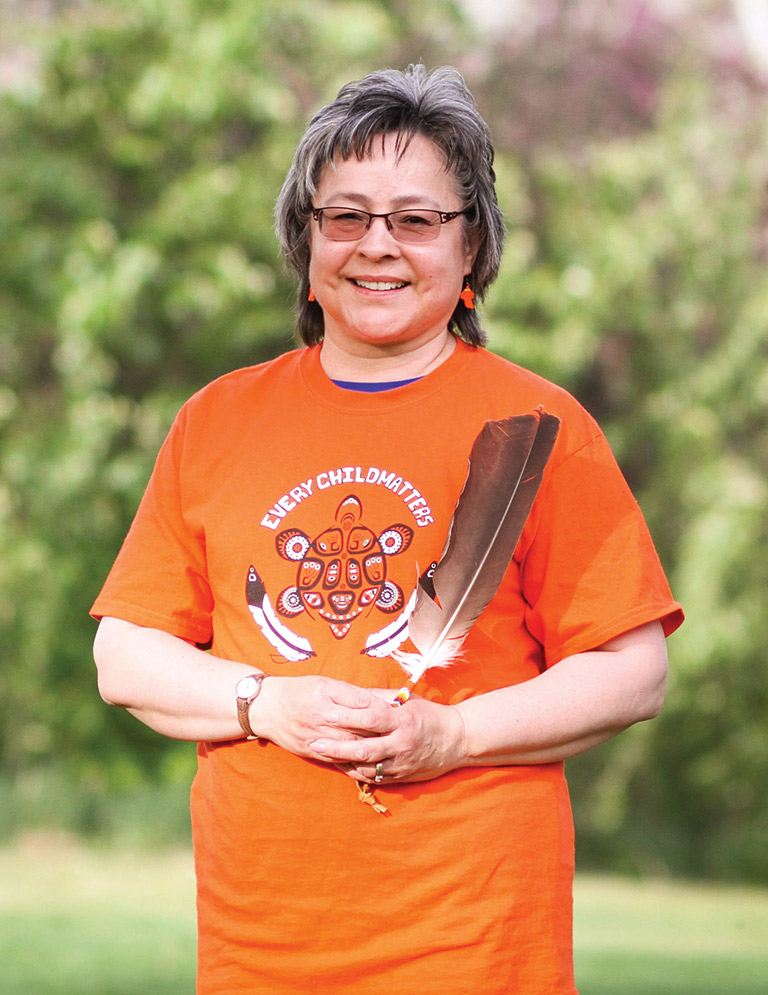Ryerson honours the children who were sent away to residential schools

Community members gathered for Ryerson’s fourth annual Orange Shirt Day event online, via Zoom, on Wednesday.
“Every year, the Ryerson community comes together for Orange Shirt Day in the spirit of truth-telling and reconciliation,” says Brian Norton, program co-ordinator for Ryerson Aboriginal Student Services.
Orange Shirt Day — a national day of recognition for the history of residential schools — takes place annually on Sept. 30. The residential school system was implemented by the Canadian government and responsible for separating Indigenous children from their families and systemically undermining Indigenous culture.
Norton says the event aims to provide a multi-generational space to have conversations about the impact the residential school system had on Indigenous people and the legacy it left behind in the community.
“We can all relate to the injustices that were done to the residential kids. A lot of those injustices are still happening around the world today,” says Joanne Dallaire, campus Elder and senior adviser of Indigenous Relations and Reconciliation.
“I look forward to more and more growth, and more and more opportunities for Indigenous people to conquer that residential school history and live the life that they so richly deserve,” she added.
For educators and students across the country, September symbolizes the start of a new school year. However, for Indigenous communities, September brings painful memories and serves as a reminder of the mental and physical abuse Indigenous children endured.
“Orange Shirt Day commemorates the time of year when Indigenous children were taken from their homes to residential schools, and for our university, this has special meaning,” says Ryerson president Mohamed Lachemi.
Lachemi recently announced a presidential task force to examine the legacy of the school’s namesake, Egerton Ryerson, and his relationship to the residential school system.
“This is an important process in our university’s community’s long journey to reconciliation. Understanding history, learning the truth is an important step,” says Lachemi. “Today, I’m reminded of the quote from Justice Murray Sinclair who said, ‘education brought us in this mess and education will get us out.’ We press forward on reconciliation with optimism, and we hope we can create for generations to come. On Orange Shirt Day, I join with you and all members of the Ryerson community in remembering and reflecting.”
The lasting effects of the residential school system are still a burden to Indigenous communities across the country. The last residential school in Canada was not closed until 1996.
“We’re reminded how important it is to pause, reflect upon, and share our commitment to reconciliation,” says Saeed Zolfaghari, professor and vice-provost of faculty affairs at Ryerson University. “The history of residential schools in Canada is still being lived by many survivors and their children, this is a troubling past that some of us are still trying to understand.”
Even though the survivors of residential schools are now adults, this event affirms their living experiences matter, as well as recognizing the multiple generations that have also been impacted.
Denise O’Neil Green, vice-president of equity and community inclusion, says we must recognize “the pain that was caused by that system and in turn so robbed many Indigenous peoples of their culture and left them with physical, emotional and psychological trauma.”
Green also quoted Sinclair, who is now a senator, after he was asked by a journalist what he would say to people who wanted to get involved in truth and reconciliation but were unsure how:
“I always tell people, you’re already involved in truth and reconciliation whether you like it or not. This is not an audience sport: reconciliation is a participant sport and they are already engaged. The real question is how are you engaged and how do you want to change your engagement. In summary, the work of truth and reconciliation is everyone’s obligation.”
The event also featured a reading of the picture book Phyllis’s Orange Shirt, Phyllis Webstad’s first-hand account of her experience as a survivor of residential schools, told from the vantage point of a six-year-old child.
“I think the beauty of the picture book is it allows everyone to have an entry point into the discussion,” says Marni Binder, from the school of early childhood studies. “It doesn’t matter where you’re coming from; it allows you to enter in a very good way and in a very safe way. It’s one way we can get conversations started.”
The symbolism behind Orange Shirt Day comes from an orange shirt that Webstad’s grandmother bought for her first day of school at St. Joseph’s Mission Residential School outside Williams Lake, B.C. Her shirt was stripped from her upon arrival and replaced with the school’s uniform.
Since 2013, Orange Shirt Day commemorates and honours survivors like Webstad. It is an opportunity for First Nations, local governments, schools and communities to come together in an initiative to take back ownership of the orange shirt in the spirit of healing, reconciliation and hope for future generations of children.
